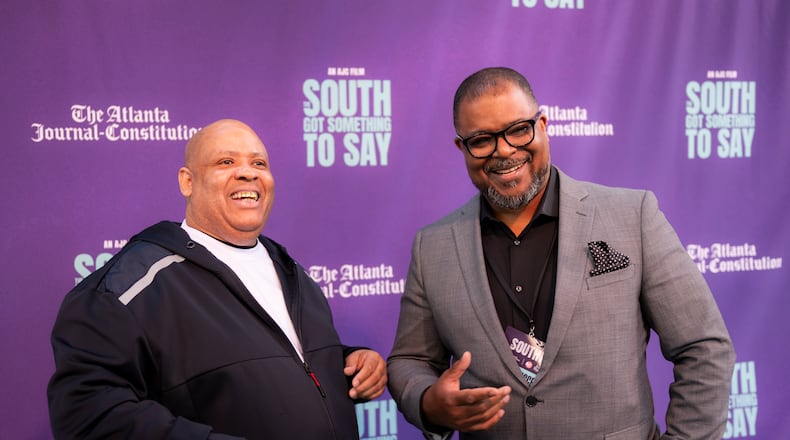While Leroy Chapman became the first Black editor-in-chief in the history of the AJC earlier this year, it was long before 2023 that he became a fan of hip-hop.
Leroy has a subtle style in signaling his affinity for the culture. I’ve not personally seen him perform breakdancing maneuvers like the “windmill,” heard him making “human beatbox” sounds or creating drum beats on a desk with his fist, recite lyrics in a rap freestyle “cypher,” play and mix music for others to dance at a party, or use spray paint to write his name on the walls of our offices (yet).
But one way to tell that hip-hop is an inspiration to Leroy is in an often underappreciated but highly important sector of hip-hop culture: fashion. You’ll always find him impeccably dressed, quite often while rocking a pair of inconceivably clean sneakers as a finishing touch.
As an executive producer of “The South Got Something To Say,” AJC Films’ first full-length feature documentary, Leroy’s history with hip-hop helped him guide the direction of the movie, which you now can watch right here.
Now that the film has been released, our team of journalists covering Black culture wanted to know more about what hip-hop means to our newsroom’s leader. He graciously took time to answer questions which let us know that while he certainly knows how to pull off the look of the coolest editor-in-chief in media, hip-hop’s not just on him; it’s in him.
What was your introduction to hip-hop?
Like many people, it was “Rapper’s Delight.” I was in 4th grade.
Who did you see perform at your first hip-hop concert, and what was that like?
It was the Fresh Festival at the Greenville Memorial Auditorium. I saw Run-DMC, Whodini and L.L. Cool J. I was a big, big Run-DMC fan. But young L.L. made me walk around shirtless. And get in trouble with my mama.
Credit: Credit: Leroy Chapman
Credit: Credit: Leroy Chapman
Who is your favorite Atlanta hip-hop artist?
OutKast. I was hooked at “Player’s Ball.” I was in college when it dropped. Seeing guys who were authentically Southern and who looked and talked like the guys I grew up with was game-changing. Hip-hop was dominated by New York and the West Coast. I was in California during my Navy days and saw Los Angeles take off and claim their version of hip-hop. It wasn’t until OutKast dropped five years later that I experienced what I saw the West Coast experience when NWA, M.C. Hammer, Digital Underground, 2 Short were pioneering a different version of hip hop.
Do you have a favorite Atlanta hip-hop song?
“Liberation.” Seeing OutKast perform it live with CeeLo and Eryka Badu at the One Music Fest [in 2016] was unbelievable.
How have you seen Atlanta evolve over time in the hip-hop space?
My first memory was M.C. Shy D. Then, Atlanta was mimicking what it thinks hip-hop is and should sound like as dictated by New York. Eventually, we found our own voice rooted in Southern influences both musically and culturally. What Arrested Development did was revolutionary. And that kind of creative brilliance has sustained.
How has your affinity for hip-hop influenced your personal life?
In many ways. Before the internet, music and television were the biggest influences on youth. And I discovered Public Enemy in high school. My desire to keep up with Chuck D. had me reading books I might not have otherwise read. Same for KRS One. Also, the hip-hop ethos demands self-confidence. Hip-hop is aspirational. It’s competitive. It unlocked for many of us what’s possible and tapped a belief that we could make it. Now that I’m older, hip-hop is something I share with my children. My son loves OutKast. And we can talk about the golden era of hip-hop. He introduces me to new artists he thinks I might like. I share hip-hop with him like my dad shared baseball with me. There is generational connection now and generational comparison.
Credit: Credit: Leroy Chapman
Credit: Credit: Leroy Chapman
Being in the field of journalism, do you see parallels between the storytelling nature of hip-hop and reporting for news audiences?
In one specific sense. I think there are some authentic storytellers in hip-hop and I think journalism has to be authentic or it isn’t journalism. For the most part, hip-hop artists are playing characters, exaggerated versions of themselves. But when you hear Kendrick Lamar talk about his struggles with mental health, addiction in his family and overcoming poverty, it is personal and powerful. Same for Killer Mike on his latest album, laying bare some of his struggles, contradictions and triumphs. Those expressions are as raw and unfiltered as the best journalism. There was a time when Chuck D called rap “Black America’s CNN” because it was one of the few forums where there were deep discussions about the devastating impact the war on drugs was having on Black communities and police brutality. The music no longer has that burden now that we have the internet.
Why is it important for the AJC to cover hip-hop, and what is the AJC’s role in hip-hop coverage?
Atlanta’s identity – here in this city and to the outside world – is heavily defined by hip-hop. I would argue that there is not a more hip-hop city in America. New York, where hip-hop was born, is a hip-hop city. But if you were listing the things that define New York City, there are probably a dozen other things that would rank higher than hip-hop. Same for L.A. Here, the list is much shorter. Also, Atlanta is the world’s chief exporter of Black culture. That is heavily defined by hip-hop. And as the genre has matured, it has become more institutional and influential in politics and business. We saw the founders of Quality Control Records hosting fundraisers for a mayoral candidate. Hip-hop is in politics. Ludacris, Lil Yachty, Lil Nas X and Lil Baby are all doing Super Bowl commercials. Brands want to align with Atlanta hip-hop. The AJC cannot tell authentic Atlanta stories without understanding hip-hop. Our role is to have authentic conversations with and about this community.
Is there a particularly memorable Atlanta hip-hop story or moment the AJC has covered that really resonates with you?
There are several. OutKast packing Centennial Park for three straight days back in 2014 is something we may never see again. There were about 20,000 people each night. I remember the shows sold out in minutes. We had great access and we turned some great stories about OutKast, hip-hop and this city. Then there is the Super Bowl snub and the NFL, after realizing the blunder, adding Big Boi to the halftime show here in Mercedes Benz Stadium. Seeing the Dr. Dre show in LA only reminds us of how wrong the NFL got it when it hosted the Super Bowl here. Lil Nas X coming out on World Pride Day was a big story at the time. I will also never forget the story about Ludacris’ rider when he played the UGA spring game. That was a cultural flashpoint. The most emotional moment was Takeoff’s funeral. I wrote a column. I went to the funeral hoping to hear a call to action to end the senseless violence that claims some of our best.
Are there Atlanta hip-hop stories that you feel are untold and would like to see the AJC to cover in the future?
Yes. An untold story is how hip-hop has always been a disrupter. The art form is essentially born out of Black teenagers taking the technology of the day and creating something out of nothing. That ingenuity has forever changed how music is made and how music is sold. Hip-hop’s pioneers are essentially tech nerds. But we don’t frame the story that way mostly because that’s not how we picture tech nerds. We repeatedly say that hip-hop influences everything. We should chronicle the depth of the influence, who profits and who doesn’t.
About the Author
Keep Reading
The Latest
Featured





